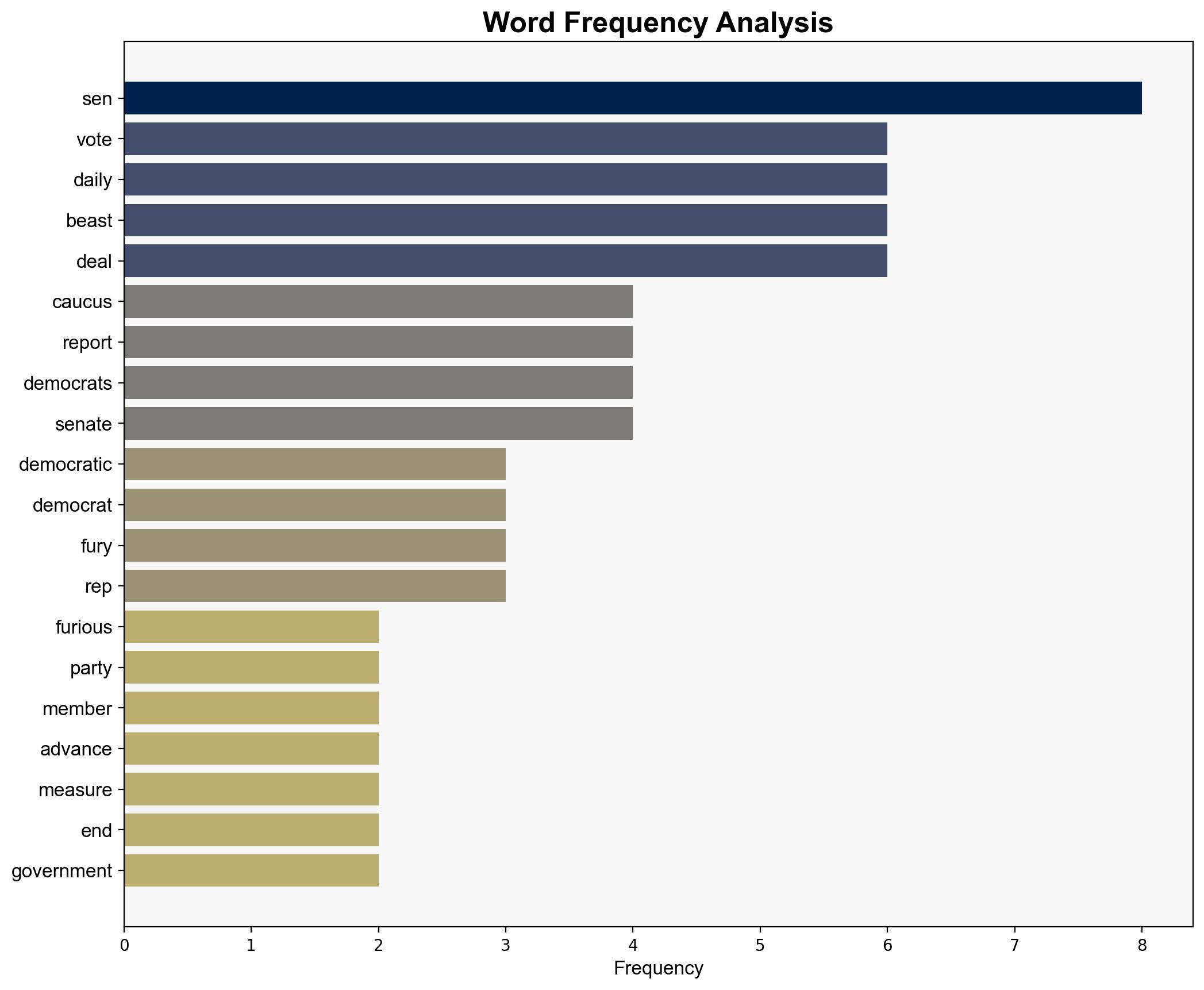Angry Democrats brew ‘furious civil war’ after ‘lousy’ shutdown deal – Raw Story
Published on: 2025-11-10
Intelligence Report: Angry Democrats brew ‘furious civil war’ after ‘lousy’ shutdown deal – Raw Story
1. BLUF (Bottom Line Up Front)
The Democratic Party faces significant internal conflict following a controversial government funding deal perceived as a capitulation to Republican demands. The most supported hypothesis suggests this discord could weaken the party’s unity and effectiveness in upcoming legislative battles. Confidence Level: Moderate. Recommended action includes strategic communication efforts to unify party messaging and address constituent concerns.
2. Competing Hypotheses
1. **Hypothesis A**: The internal conflict within the Democratic Party is a temporary reaction to the shutdown deal and will not have long-term consequences. This hypothesis suggests that while there is immediate backlash, the party will reconcile and refocus on shared goals.
2. **Hypothesis B**: The internal conflict signifies a deeper ideological rift within the Democratic Party, potentially leading to prolonged disunity and weakened legislative influence. This hypothesis posits that the disagreement over the deal reflects fundamental differences in priorities and strategy.
Using the Analysis of Competing Hypotheses (ACH) 2.0, Hypothesis B is better supported due to the intensity and breadth of the backlash, as well as the involvement of multiple influential party members and advocacy groups expressing dissatisfaction.
3. Key Assumptions and Red Flags
– **Assumptions**: Hypothesis A assumes that party unity is resilient and that shared goals will eventually override current disagreements. Hypothesis B assumes that ideological differences are significant enough to impact long-term unity.
– **Red Flags**: The reliance on anonymous sources and the potential for media exaggeration could skew perceptions of the conflict’s severity. Lack of direct statements from key leaders like Chuck Schumer could indicate strategic silence or internal negotiation.
4. Implications and Strategic Risks
The internal discord could lead to decreased effectiveness in legislative negotiations, impacting key policy areas such as healthcare and economic reform. If unresolved, this rift may embolden opposition parties and weaken the Democratic Party’s public image. There is also a risk of alienating the party’s progressive base, which could affect voter turnout and support in future elections.
5. Recommendations and Outlook
- **Mitigation**: Initiate dialogue among party factions to address grievances and align on core priorities. Develop a unified communication strategy to reassure constituents and clarify party objectives.
- **Opportunities**: Leverage this moment to reassess and potentially recalibrate party strategies to better reflect constituent priorities.
- **Scenario Projections**:
- **Best Case**: The party resolves internal differences, emerging stronger and more unified.
- **Worst Case**: Prolonged disunity leads to legislative failures and decreased public support.
- **Most Likely**: Short-term disunity with gradual reconciliation as shared goals take precedence.
6. Key Individuals and Entities
– Catherine Cortez Masto
– Dick Durbin
– John Fetterman
– Maggie Hassan
– Tim Kaine
– Angus King
– Jacky Rosen
– Jeanne Shaheen
– Chuck Schumer
– Becca Balint
– Jared Huffman
– Greg Landsman
– Ezra Levin
7. Thematic Tags
political strategy, party unity, legislative effectiveness, ideological conflict





